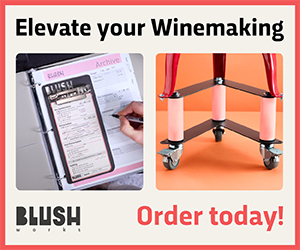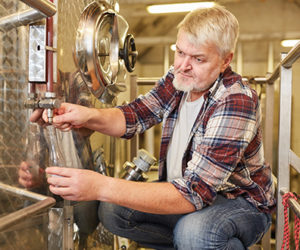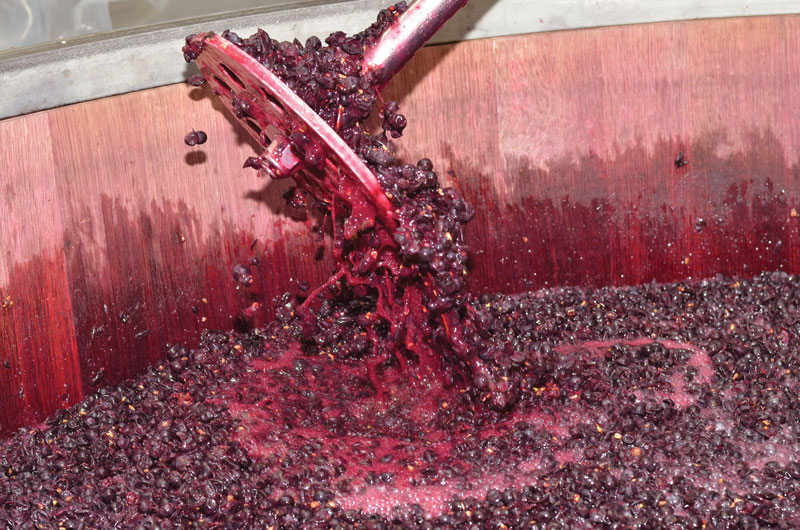 So, you want to take your wine/mead/cider-making hobby to the commercial level? Good for you, and you’ve accomplished the first step, which is to start thinking about the idea! You will want to keep doing this. Advice abounds, and if you ask around long enough you’ll hear cautionary tales as often as you’ll hear good, usable advice. That is alright though, the warnings are a reminder of the risky choices inherent in this type of project. The straight story is that you must REALLY want to make, market, and sell wine (or mead, cider, etc.) professionally in order to get it right. The key to success will be how you react and how you use the resources you have when things change, because things will always change.
So, you want to take your wine/mead/cider-making hobby to the commercial level? Good for you, and you’ve accomplished the first step, which is to start thinking about the idea! You will want to keep doing this. Advice abounds, and if you ask around long enough you’ll hear cautionary tales as often as you’ll hear good, usable advice. That is alright though, the warnings are a reminder of the risky choices inherent in this type of project. The straight story is that you must REALLY want to make, market, and sell wine (or mead, cider, etc.) professionally in order to get it right. The key to success will be how you react and how you use the resources you have when things change, because things will always change.
In April of 2016 my wife and I began the planning for launch of Ancient Fire Mead & Cider, a boutique producer of meads and ciders that would be based in southern New Hampshire. By the fall of 2016 we were immersed in the business planning and had begun scouting for locations. We worked with our local SCORE Association chapter (a network of volunteer, expert business mentors) to get advice and counseling, something that helped us stay on track building out our financials and refining our pitch for the loan we were seeking. We found a location in early 2017 and by July 2017 had secured it and begun our permitting process with the Alcohol and Tobacco Tax and Trade Bureau (TTB). Financing fell into place in the fall of 2017, including a loan through a local economic development corporation associated with the city we situated our business in. For the remainder of 2017 we were in construction mode working with a local contractor as well as doing some of the work ourselves. After nearly two years of planning and preparing, we finally opened the doors to our business on March 1 with the first of three product lines for sale. We still have a lot more work to do on the marketing and sales front, but every bit of planning we have done can be seen in the tap room we just recently opened, and the production facility that sits behind it.
In this article I intend to raise lots of questions and provide some tips in a whole bunch of areas that you’ll ultimately need to spend time working on in order for you to successfully plan a project to go pro. I won’t be taking you through the entire process of opening a complete and operating business, but rather get you to the point where you can get moving to build a solid foundation for your vision. A lot of this is common to non-beverage businesses as well, but the specifics will keep you in the beverage mindset.
Assemble The Team
Bring together owners, primary investors (if you have them), and any other decision makers. Make sure everyone knows each other. Initially ask them to work as a group to discuss the strengths and weaknesses of the idea/project and how to turn that information into useful business plan components. Take good notes.
Every successful ownership team also retains trustworthy business partners to help them with legal, insurance, real estate, financial, and compliance matters. Get out and find them. Build your team to include people who can help you by planning and researching “in-house,” but also those that can provide value-added and advisory services as you explore your goals. Once again, hire those who are engaged.
Have A Plan
Create a business plan. The plan should describe your vision, your mission to execute that, who is behind the company, how it will get launched, who you are competing with, and where you expect it to go a couple years out into the future. This is a great exercise for an ownership team to go through. You learn about your plans, learn about each other, as well as find so many things to discuss, make more specific, and of course meaningful to you as the founders. To familiarize yourself with the ins and outs of a plan, find templates or completed plans to review so that you have an idea of what you need to include as well as how to phrase it. There are also a number of resources out there to help understand the different aspects of the beverage business. Entrepreneur Magazine has published some, and college or graduate school textbooks are always a good place to start.
Talk to competitors, retailers, bars, restaurants, similar area businesses, and other new local businesses owners about the local beverage industry. Find out what starting a business has been like in your area. Find out what other beverages like yours sell for in all the different venues where you expect to compete with them.
Be sure to identify early on what parts of your plan are absolutely required for the project. Tap into local economic development organizations, the Small Business Association (SBA), the nonprofit SCORE Association, and other available resources to help you understand aspects of the business planning process with which you are not already familiar. You need to know your plan and craft your pitch as you evangelize for your project. These resources can help you do this.
Don’t Fear The Financial Analysis
Before we speed past the new business plan you’ve created, it makes sense to reinforce that spending time on the financials of your business plan will absolutely help you. You may need help with it — we did — but going and getting that help will take you farther than you can imagine.
Grab hold of something, but here is a mouthful of concepts you will need to get your head around. Cash flow statements, fixed expenses, variable expenses, cost of goods sold (COGS), seasonal sales forecasts, weighted gross margin (WGM), calculating breakeven, a production calendar, staffing forecasts, and so on, all including components like insurance and taxes! Just look all this stuff up, and then find someone (like the previously mentioned SCORE, SBA, and local economic development resources) to help with the parts you don’t immediately get. You will eventually get it, and you’ll appreciate knowing how to understand the impact of your decisions when you do.
Financing Your Project
Every project needs resources, and financial ones are never in great enough supply. You will need to know what funding you already have and what additional types you are interested in seeking. Make sure you have a realistic understanding of what funding sources actually net you versus what they will cost you.
Develop a startup budget that includes categories like owner equity, loans, crowdfunding, equipment, construction/upgrades to the facility, and startup costs like marketing, six months of COGS, and operating expenses, etc. Net it all out so you can get a good idea of how much money you need.
Talk with local economic development authorities about revolving loan programs and startup services. Get involved in the local chamber of commerce and/or other professional networking groups. You will meet lots of great people who can help you reach out and find leads to chase down. Be ready to explain a summary of your business plan (your “elevator pitch”) including highlights from your financials. Network your way into partnering with others who can loan you money based on your planning and ability to speak to how you are going to grow your initial success. Keep in mind that while you may simply love the beverages you make, business investors will expect a financial return on their investments. You need to make a profit to remain in business.
Get Hands On
Do you have any friends who work at (or own) a winery or brewery? Ever worked with them there before? You should.
There are definitely some equipment differences between home and commercial production, and scale alone can make translating the experience working in a local winery for a day to your project challenging. The understanding of the processes and what modern industrialization can do for you is well worth any time spent. Learn how to break down and clean a tank. That next wine that goes through it will be sold to the public and because you made sure the tank was clean, it will be the best it can be! The networking opportunities through hands-on volunteering are invaluable.
Company Branding, Marketing, & Sales
What is your brand all about? How does your vision translate to something tangible that can be demonstrated to business partners, investors, or customers? How do you plan to represent your brand visually? Will you be engaging a branding designer that will develop a branding package that represents your brand online, in print, on gear and signage, and ultimately labels?
As the owner of a startup meadery I coined a twist on a phrase my brother-in-law once said to me about being a sales guy. “Always be(e) hustling” is what I say I am doing when I am making mead, marketing Ancient Fire or even taking out the Ancient Fire trash bin.
You have to sell the product you make, which means someone from your team will need to spend time marketing it, and actually doing all the work to educate, share samples, answer questions, and ultimately take and fulfill orders. More time will be spent here than in making the product. Or at least, you will want this to be the case soon.
Are you selling to retail customers? Can you direct distribute? What kinds of accounts are you looking for? What formats will your product come in? What kind of promotions can you do? How do your marketing expenses return on investment? You’ll need to work answers to these questions out as part of your plan, and you will soon be ready to get out there and make some sales.
How you market your new business from the first day you want to go public with the vision is something you will want to work out early. You won’t be selling product on day one of your planning, but you are already marketing your brand, so working this out before a lot of other aspects of the project, including many of those physical ones, will ultimately set the tone for how customers engage with your brand.
Looking For A Location
Leasing or buying a location for your winery is going to be a complicated equation for your project, and so much of what needs to be put into the details is going to come from you. But, here are some general tips to make vetting locations productive: Pick a few towns, and get a feel for their zoning, permitting, and other processes. Talk to someone who opened a similar business in these same areas if you can. A real estate agent will be a huge asset — they know the local market, but they also know so many helpful people! Work out how they get paid in a contract up front and work it out in terms commonly used in your area so other agents and potential landlords won’t be met with something they aren’t used to.
I leased a space for my business so I can provide tips on that process. Buying a property will be different up front, but many of the concerns around usage will be the same, and you’ll want to get all that worked out in advance.
When you see a promising space, pull its property and land use information and ask the local zoning/planning officials if the type of business you want to run is permitted there. If it is, you need to look more closely at the space for what is necessary for your business. If not, you’ll need to wade into land use and zoning variances, the process for which is going to vary from locale to locale.
Once you’ve identified one or more spaces that might be a fit, talk to plumbers, electricians, contractors, and the landlord about what you want to do and how it might be accomplished in the space. You’ll also need to consider local health codes, local fire and safety codes, parking, and handicap requirements.
Typically, to get a landlord to take your interest in a space seriously, you would draft a letter of intent (LOI) that outlines the terms you would like them to entertain for a lease. Just like the real estate agent contract, and a agent should help with the LOI, you’ll need to draft the LOI in terms consistent with local and state law, as well as in terms that the market typically works within for the best outcome.
There are several different commercial lease types out there, your real estate agent should have surveilled this for any property, and understanding how they work can help with expectations of how your costs will break down. You’ll also want to get a feel for annual increase and lease renewal terms as well as any sublet/escape clauses that will apply to a potential lease you may want to enter into.
You will definitely want to have a local real estate attorney review a lease for you and help coordinate any changes to be negotiated with the landlord. This section may read somewhat simple, but it is a complex and important aspect, one you should give appropriate time to.
Federal Permitting
Working with the Alcohol and Tobacco Tax and Trade Bureau (TTB) and the Permits Online system is recommended, but is not entirely a straightforward exercise. The paper forms are the older way to go, and are definitely no longer efficient.
What to review first? You’ll need a location and a signed lease to get the process started; the federal alcohol production bond is site-specific. You’ll also want to have a diagram of how your space will be laid out. You are essentially making yourself known as an alcohol producer to the federal government so they want all sorts of information, including the sources and uses of any money the company has or is expecting commitments to. They will also ask for background information on all owners (more than 5%) so it makes sense to consider the ownership structure before you get here.
You do not necessarily need to engage an attorney for this process — we didn’t — but that is done with some frequency based on this question coming up in trade circles.
State & Local Licensing
You’ll need to understand the applications, fees, and purposes of all sorts of things, including business licenses and permits of assembly. It varies town-to-town, and state-to-state, so you’ll need to explore this topic independently. Identify the regulatory agencies and give them a call. Most will have resources on their websites or will send them to you upon request.
Where Do You Go From Here?
Head spinning yet?
At this point if you’ve done the aforementioned, then you have informed yourself across an array of topics for the project you hope to take on. You should have a vision and a team energized to take it public. With the exception of the costs associated with building out and working in a specific location, the production equipment, labor, lots of miscellanea, and any unique aspects of your business, you should have the core of a startup budget in view. You’ll want to fill in the rest as you further refine your vision and make decisions about where and how you will be operating.
With the above foundation, you are ready to dive into securing a location, finalizing the build out costs, entering into permitting/licensing, and getting your new space ready to go.
There is much work ahead, but it will be worth it when you get to serve the first customer in your new facility.
Related Link:
Thinking about taking your hobby pro, but not interested in running the business? Read our “Going Pro Roundtable” for advice to get you on your way down that path: https://winemakermag.com/technique/1235-going-pro-roundtable







